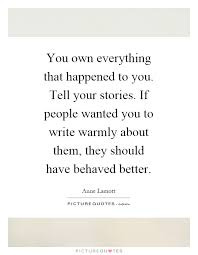Creative Nonfiction, Family History, and Jewish Law against Harmful Speech
How the prohibition against lashon hara has shaped my collection
Here is a draft of the forward to my collection:
Forward:
In Judaism, we are prohibited from engaging in lashon hara, which literally translates to “evil tongue.” It means speech (which includes all ways of communicating a thing, not just utterances) about a person that could cause harm, even if one is speaking the truth. This harm isn’t limited to the sort of things we think of as actionable in court, such as physical or financial damage, but includes embarrassment.
This goes against Anne Lamott’s famous, “You own everything that happened to you. Tell your stories. If people wanted you to write warmly about them, they should have behaved better.” Memoirists love this quote, as it seems to remove any moral onus on them to think of the impact of their work on the people included in it. I’ve always found it deeply problematic at best, and actively immoral in cases where writers capitalize on the bad behaviors of their family members and loved ones—or, I assume, former loved ones—in ways that intentionally elide the complexity of those people and flattens them into their worst moments.
There are, of course, exceptions to the prohibition against speaking about a person in a way that could cause harm; if there weren’t, there would be no way for the Jewish legal system to function. It may be permissible or even obligatory to share negative information. However, strict guidelines apply, including ensuring the information is true, it's the only way to prevent harm, and the intention is purely for protective purposes. Even then, the only permissible purpose of speech that may cause harm to another is to do so with to’elet, constructive intention, and then only after the issue has first been addressed with the person who might be harmed privately and there must be no other way to achieve the constructive purpose.
Constructive purposes do not include selling more copies of a work of creative nonfiction.
There have been, in my family, people who very good and a few who were not. For the most part, you’ll find in this book the stories of those who were good. Poor old Uncle Henry will have to stand in for all those whose actions were more questionable; he is long dead and, to the best of our knowledge, has no descendants. So I can tell you the salacious story of his ignominious end and it will not harm anyone. Let him stand as a synecdoche for all the poor decisions in our family history.
Which, it’s true, made the writing of this book a little harder. There are some pretty interesting stories of wrong-doing, and where leaving out those stories would valorize someone it shouldn’t, I’ve just left that person out of the collection.
This is, in no small way, a choice I can make because nobody in my family has ever done anything to me that would require some sort of public airing and redress. Those writing family histories who come from abusive backgrounds or were endangered by their relatives’ bad choices, have reason to make a different one. This is in no way an indictment of those writers, many of whose works I admire and often assign to my students, some of whom themselves find them helpful in coming to understand and heal from their own difficult family lives.
I just didn’t have a difficult family life, and what difficult people there were in my family were largely kept at a distance. So the stories I have to tell are mostly of awe at the bravery of those who brought us to this country, the ingenuity of those who forged lives for us here, and gratitude for those who continue to do the same for the generations.
Not every family story is one of hardship and deprivation. Mine certainly isn’t. Mine is a story of being loved, safe, and more than a little indulged. If only that could be true for every child, it would be a better world.
How have you managed this, friends? Where do you draw your lines when writing about other people?




I sure love my cousin Sarah. She’s a pip ❤️
Fortunately, these days, I'm reading way more writing than I'm doing. And most of my writing doesn't talk about family.